In part one of this post we looked at coverage ahead of and just after the violent rioting on Temple Mount on the morning of April 15th as presented on the BBC News website and BBC World Service radio.
Later that day the BBC News website published a report headlined “Jerusalem: Over 150 hurt in clashes at al-Aqsa Mosque compound”.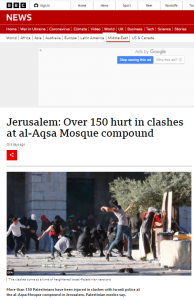
As we see in that headline and in the body of the report itself, the BBC continues to use the term ‘al-Aqsa Mosque compound’ to portray what its style guide instructs should be described as Temple Mount and Haram al-Sharif. One particularly notable aspect of this latest report is the indication that the BBC has now fully adopted the relatively recent politically motivated Palestinian narrative relating to that site:
“The compound is known to Muslims as Haram al-Sharif (Noble Sanctuary) and is also considered, in its entirety, as al-Aqsa Mosque. It is the third holiest site in Islam.
The same ground is sacred to Jews as the location of two biblical temples, and is the holiest site in Judaism.” [emphasis added]
Portrayal of what actually happened on Temple Mount early on the morning of April 15th is presented using the ‘Israel says’ formula rather than on the ample available footage and photos which the BBC could have used.
“Israeli police said officers entered the site after coming under attack with fireworks, stones and other objects.
Three Israeli police were hurt, they said. […]
Israeli police said dozens of Palestinians, some carrying flags of the Palestinian militant group Hamas, marched on the compound at about 04:00 (01:00 GMT) then started throwing stones and fireworks.
The police said they waited until Muslim Friday prayers had ended before entering the site to disperse the rioters, who had started throwing stones towards the Western Wall below the compound, where Jewish worshippers were.” [emphasis added]
The report’s explanation of the background to those events is as follows:
“The clashes come after militant groups in Gaza called for “hundreds of thousands” of Palestinians to converge on the compound on Friday “to protect our nation and our mosque”.
Last year Hamas, which governs Gaza, fired rockets towards Jerusalem following clashes at the mosque compound after weeks of unrest in the city, triggering a devastating 11-day war with Israel.”
Once again BBC audiences are given no relevant information concerning the pre-planned and organised nature of that morning’s rioting or the fact that false allegations concerning the supposed need to “protect” the site have been used as a pretext for violence for over a century – including in May 2021.
The results of the pre-planned violence on Temple Mount that Hamas and other terrorist organisations had been inciting for over a month were also the topic of several BBC radio reports on April 15th.
The lead item in the afternoon edition of the BBC World Service radio programme ‘Newshour’ (from 00:11 here) was portrayed as follows: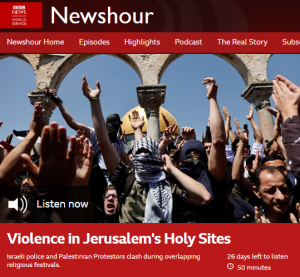
“Tensions are high in the holy city of Jerusalem after violence between Israeli police and Palestinian protestors left more than one hundred and fifty people injured. We hear the latest from there.”
Presenter James Menendez opened the item: [emphasis in italics in the original, emphasis in bold added]
Menendez: “And we’re gonna start today in the Middle East and violent clashes in Jerusalem in the Aqsa Mosque compound in the Old City. It is a site sacred to both Muslims and Jews. For Muslims it’s the Haram al-Sharif or noble sanctuary, the third holiest site in Islam. For Jews it’s known as the Temple Mount and revered as the location of two ancient temples. Add to that an unusual confluence of religious festivals – Passover is about to start, it’s the middle of Ramadan and it’s Easter weekend – and already high tensions after a deadly spate of attacks by Palestinians and Israeli Arabs on Israelis and retaliatory raids on Palestinian areas. Well, the clashes today began early in the morning after morning prayers. Footage from the mosque shows young Palestinians, some masked, letting off fireworks and throwing stones.”
Menendez refrained from providing any details concerning the identity of those “young Palestinians” or how they obtained the fireworks and rocks they used as weapons.
Following a recording, Menendez went on to present an uncorroborated account:
Menendez: “One of those injured in the clashes was a Palestinian cameraman, Rami al Khatib, who accused Israeli police of violent tactics.”
Voiceover: “They brutally entered the compound. They were attacking the employees of the Waqf, normal people, elderly, young people. There were many injured. They fired rubber bullets inside the al Aqsa Mosque compound. They were beating everyone. They even hit paramedics. They attacked the paramedics inside the compound. I hope it will get better.”
Menendez then introduced the BBC Jerusalem bureau’s Yolande Knell who completely ignored the fact that the incident was pre-planned and failed to inform listeners of the related incitement from Hamas and other Palestinian factions.
Knell: “You can see some videos. Israeli riot police had batons that they used, rubber bullets, stun grenades. They entered into the compound, they say, to disperse the protesters and they point out that several of their own officers were injured as well as this high number of Palestinians that we’ve been hearing about from the Palestine Red Crescent. But tensions were always going to be high at this unusual time when the three faiths have holidays together but you could see that the Israeli security forces have been on extra high state of alert because of course we had in the past two weeks the most deadly attacks in Israel for years that killed 14 people and since then, Israeli troops have stepped up what they have called counter-terrorism operations in the occupied West Bank. And we’ve had some 20 Palestinians have been killed, including those who were carrying out attacks or said to be planning them. But that has really ratcheted up the tensions even further.”
Menendez: “What are the latest figures? How many people were injured on both sides?”
Knell: “Well according to the Palestinians at least 152 were injured in clashes and then the Israeli police pointing out that their forces also came under attack with fireworks being used and stones being thrown at them and that several of them were injured as well, although not seriously. […] But the concern is really that the calm could be short-lived because we have had the lessons that whenever there are confrontations at this most contested holy site; Haram al Sharif for Muslims where the al Aqsa Mosque is, it’s the third holiest site in Islam. Of course for Jews it’s the site of two biblical temples; they call it Temple Mount. It’s the holiest site for Jews. Any confrontations there always carry the danger of a kind of slide into a wider conflict between Israel and Palestinians.”
Following that report from Knell, Menendez introduced the deputy mayor of Jerusalem, Fleur Hassan Nahoum. That part of the item can be heard here, including Menendez’s aggressively presented questions based partly on pure hearsay:
Menendez: “Why did Israeli police storm the Aqsa compound at a sensitive time – during Friday prayers, during Ramadan?”
Menendez: “Was it a proportionate response though? Rubber bullets, stun grenades, batons, mass arrests and as we heard from that cameraman a little earlier, paramedics being beaten up.”
Menendez [interrupts]: “Well some Palestinian witnesses say that Israel fired the first shots and actually the police went in just after the call to prayer.”
Menendez: “Yeah but of course what you call Temple Mount they call Haram al-Sharif and on that, can you understand how much of a provocation the police’s actions today are?”
The final part of the item used a template frequently seen in BBC radio programmes: an Israeli interviewee is followed by a Palestinian interview who gets the last word and is allowed to present usually unchallenged take-away messaging on the topic under discussion. Thus, at 08:34 Menendez brought in an interviewee who had been heard earlier in the day by listeners to BBC World Service radio.
Menendez: “Well let’s talk to Nour Odeh who’s a political analyst based in Ramallah in the West Bank. […] Can I just ask you to respond to some of that [interview with Jerusalem’s deputy mayor]. First, how this started. As we heard from Fleur Hassan Nahoum, she believes that it was people who were intent on causing trouble. What do you say?”
Odeh: “Well [laughs] well I think it’s a very convenient presentation done quite eloquently by your…by your guest. What she of course omitted from the description is the fact that Palestinians – hundreds of thousands of them – across the occupied West Bank and certainly in Gaza, are denied the right to reach Jerusalem and to worship freely, be they Muslim or Christian. The checkpoints that she’s talking about and the buses that she’s talking about are inside the occupied West Bank. Palestinians under the age of 50 are not allowed to enter Jerusalem and even those over 50 are harassed and delayed for hours so there is absolutely no facilitation if you will…”
Menendez made no effort to inform listeners of the actual regulations in place or why they are necessary:
“Under the newly issued Ramadan rules, Palestinian women from the West Bank will be allowed to enter Israel without a permit for Friday prayers at the Al-Aqsa Mosque, said the Defense Ministry’s liaison to the Palestinians, widely known by its acronym COGAT.
Palestinian men over 50 and boys under 12 will be allowed to enter Israel freely for Friday prayers as well, while those between the ages of 40-49 will be able to head to Al-Aqsa if they have a permit. Men under 40 will not be allowed in, according to usual policy, except if they have a permit that allows them in Israel on Fridays. […]
Around 5,000 Palestinians with first-degree relatives in Israel will also be given permits to visit them between Sunday and Thursday during the coming week, according to COGAT.”
Instead, Menendez created a strawman:
Menendez: “So what happened today? Was it a protest against that? Is that what you’re saying?”
Odeh: “Well what I can tell you is that the situation in Jerusalem is extremely tense for a lot of reasons and that there are plenty of reasons to protest. Especially in the past two weeks where we’ve seen posters and flyers circulated by right-wing Israeli settler groups offering money to Israeli settlers who can reach al Aqsa Mosque and offer offerings for Passover and a ceremony of slaughter of animals inside the al Aqsa Mosque. And clearly that would have been a disaster had it been facilitated. But it certainly succeeded in creating a lot of tension and apprehension, especially in light of the fact that Israeli forces facilitate the entry of Israeli settlers on a regular basis into the al Aqsa Mosque.”
Menendez: “Well what…yes, although one of the groups that you’re talking about, the Israeli authorities stopped that happening though, didn’t they?”
While Menendez did point out that the plans of a fringe extremist group had been prevented by the Israeli authorities, he failed to clarify that the intention was not to sacrifice animals “inside the al Aqsa Mosque” and that Jews (rather than “Israeli settlers”) visiting Temple Mount during the limited permitted hours do not enter “into the al Aqsa Mosque” as claimed by Odeh. Of course if BBC presenters stuck to the corporation’s own style guide concerning Temple Mount, it would be a lot easier for them to understand the crucial difference between the compound as a whole and the actual mosque called al Aqsa.
Neither did Menendez bother to ask Odeh why she was promoting the exact same talking points used by Hamas in its efforts to incite violence at Temple Mount.
Odeh: “Right, but I mean you, you know, we have to remind the listeners that the credibility of the occupier as far as the occupied population is concerned is close to non-existent. So you know Palestinians can’t really take Israel’s word for this and trust that the al Aqsa will be protected, especially again, as I said, because raids of Israeli settlers are facilitated and protected on a regular basis. It’s just at Ramadan that they become even more incendiary because according to religious custom, worshippers stay overnight and pray from night prayers until dawn prayers and so the friction becomes all the more explosive. At the end of the day the entrenchment…”
Menendez [interrupts] “Yeah, I just wanna…”
Odeh: “…of this occupation is what drives tensions. So long as it persists, all the reasons for an explosion remain.”
Menendez: “We haven’t got much time. I just wanna ask you this though: do you understand Israel’s security concerns at the moment? Several weeks in which several Israelis have been killed in attacks by Palestinians or Israeli Arabs. Do you understand why they are on edge at the moment?”
Odeh: “I understand that Israel wants to maintain the occupation invisible from its citizens and of course the death of Israeli citizens in Israeli cities would be traumatic to the public, which does not keep in mind that more than 45 Palestinians have been killed since the beginning of this year. The reality of this occupation is brutal and it is violent and it is…most of that violence is directed at Palestinians. When we talk about security we need to keep that in mind and we need to keep in mind that the solution, that a reality of peace and tranquility and security for both sides cannot be produced while the occupation persists unless…unless Israel can manage to completely suppress and subdue Palestinians and history tells us that no occupier…”
Menendez [interrupts] “Nour Odeh, we’re out of time. Nour Odeh: political analyst based in Ramallah in the West Bank.”
Once again we see that interviews with the former PA spokesperson Nour Odeh actually hinder audience understanding of a complex story and that the BBC had no intention of addressing the real crux of the issue that is the exploitation of Ramadan and Temple Mount by Palestinian factions to provoke violence but instead contented itself with promotion – including by the titles it uses to describe Temple Mount – of a politically motivated narrative.
Related Articles:
BBC COVERAGE OF VIOLENCE IN JERUSALEM – PART ONE
MAPPING CHANGES IN THE TERMINOLOGY USED BY THE BBC TO DESCRIBE TEMPLE MOUNT
PLO RECOMMENDED TERMINOLOGY CONTINUES TO APPEAR IN BBC CONTENT
PLO TERMINOLOGY RETURNS IN BBC JERUSALEM DAY REPORT
BBC ARABIC BREACHES STYLE GUIDE ON TEMPLE MOUNT
BBC NEWS REPORT ON JERUSALEM VIOLENCE PROMOTES A PARTIAL NARRATIVE

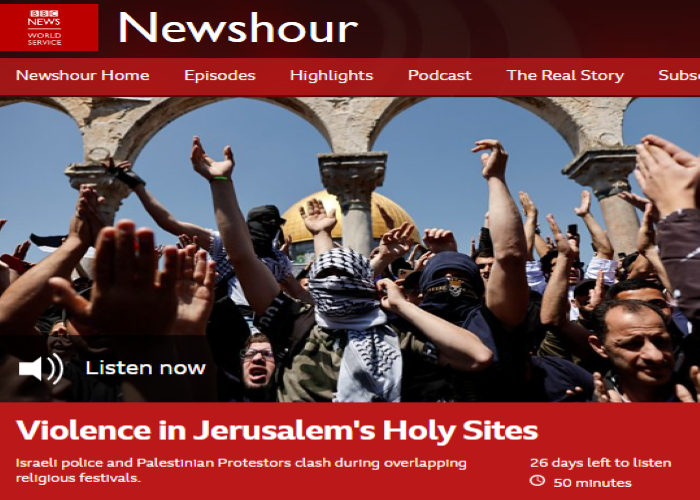


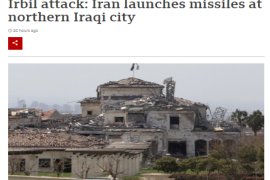
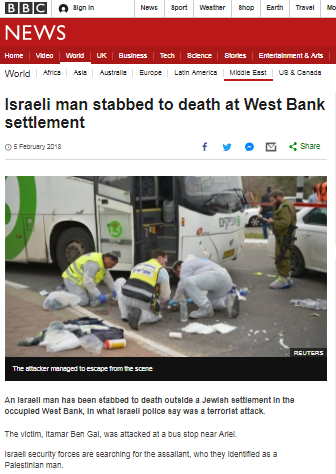
BBC Middle East reports – Simply catalogues of lies and omissions designed to demonise Israel in the eyes of the world. Never does the BBC make the point that, if Moslems behaved in a civilised and peaceful manner, none of Israel’s peace-keeping reactions would be necessary.